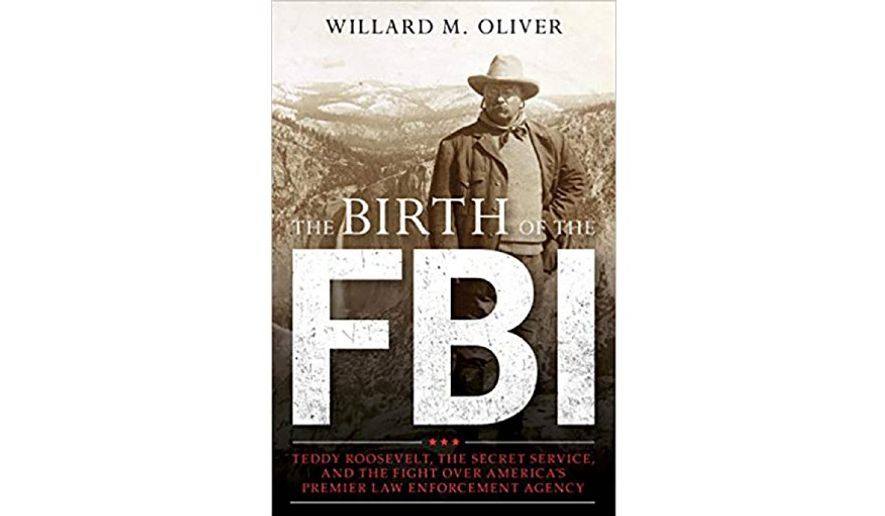OPINION:
Most people credit the birth of the Federal Bureau of Investigation to its first and longest-serving director, J. Edgar Hoover, but as Willard M. Oliver notes in his book, “The Birth of the FBI: Teddy Roosevelt, the Secret Service, and the Fight Over America’s Law Enforcement Agency,” it was actually President Theodore Roosevelt who created a federal law enforcement agency that would eventually morph into the FBI.
Roosevelt created the Special Agent Force in 1908 under the Department of Justice. The force later that year was renamed the Bureau of Investigation, the agency that preceded the FBI. J. Edgar Hoover became the third director of the Bureau of Investigation, which he remade into the FBI in 1935.
But as Mr. Oliver contends in “The Birth of the FBI,” it was President Roosevelt who should be credited with the birth of the FBI.
“The true birth of the FBI traces back to the presidential administration of Theodore Roosevelt, who created the Bureau of Investigation with the help of his attorney general, Charles Joseph Bonaparte. Although it could be said that the Bureau was created to respond to serious federal land fraud, the reality is that the FBI emerged from a political fight,” writes Mr. Oliver. “President Theodore Roosevelt, finding himself in a political row with Congress over the Secret Service, found a political solution to the problem by creating the Bureau of Investigation. So the true origins of the FBI have little to do with crime waves and criminal investigations but rather, are shrouded in the mystery of politics.”
Mr. Oliver, a professor in the College of Criminal Justice at Sam Houston State, goes on to explain that the Founding Fathers failed to empower any agency to enforce federal laws when drafting the U.S. Constitution. At first, the government relied on the U.S. Marshals Service to enforce federal laws and later the government hired the Pinkerton National Detective Agency. During the Civil War the federal government failed to curtail counterfeiting, a crime that truly hurt the economy, so the government created a second federal law enforcement agency, the U.S. Secret Service. After three presidents were assassinated, the Secret Service was also entrusted with the protection of the president.
Prior to becoming president after an assassin murdered President McKinley in 1901, Roosevelt hunted and ranched in North Dakota and later served as the New York City police commissioner. With these experiences, he brought to the White house a love of the great outdoors as well a penchant for fighting corruption.
“His conservation beliefs, mixed with his belief in law enforcement, led him to use the powers of his administration to tenaciously fight the land thieves that had become problematic in the West as a result of abuses of Homestead Acts,” Mr. Oliver writes. “When Roosevelt borrowed Secret Service operatives, as they were called then, to investigate fraudulent land deals, Congress became involved in the issue, in part because some of their own had been caught committing those very crimes.”
Congressman James A, Tawney, a fellow Republican who was the powerful chairmen of the House Appropriations Committee, was against the president using Secret Service operatives to investigate land fraud, so he attached an amendment to an appropriations bill that prevented the president from doing so. The president responded by creating the Bureau of Investigations.
The book offers a primer on early American law enforcement efforts, from the beginnings of the U.S. Marshals through the Pinkerton private detectives to the beginnings of the Secret Service, which was created to investigate counterfeiting. The book tells of how land grabbers murdered the first Secret Service agent in the line of duty. The book also offers a primer on the history of currency, and how counterfeiters nearly destabilized the economy.
And the book presents a novel look back at a fascinating and larger-than-life Theodore Roosevelt and how he matched wits and political acumen with Congress over the use of Secret Service operatives and his creation of a new federal law enforcement agency.
Readers will no doubt note the resemblance between early-20th century political conflicts between the White House, Congress and the press, and today’s political clashes. Having covered the FBI for many years and having interviewed FBI senior leaders as well as street agents, including the legendary undercover FBI agent Joseph Pistone — better known as the name he assumed when he infiltrated the Bonanno Cosa Nostra crime family for six years in the late 1970s, Donnie Brasco — I was most interested in reading this well-researched, interesting and enlightening backdrop of the issues and political intrigue that surrounded the creation of the predecessor to the FBI.
• Paul Davis covers crime, espionage and terrorism.
• • •
THE BIRTH OF THE FBI: TEDDY ROOSEVELT, THE SECRET SERVICE, AND THE FIGHT OVER AMERICA’S PREMIER LAW ENFORCEMENT AGENCY
By Willard M. Oliver
Rowman & Littlefield, $34, 334 pages




Please read our comment policy before commenting.